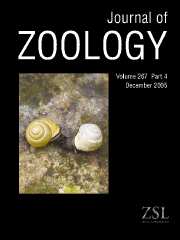Article contents
Adult mortality rates in young colonies of a swarm-founding social wasp (Polybia occidentalis)
Published online by Cambridge University Press: 01 May 2003
Abstract
The swarm founders are unusual among the social wasps in having socialized the dispersal stage of the life cycle. Colonies are initiated by groups of workers accompanied by smaller numbers of queens. Thus, swarm founders avoid the colony size bottleneck faced by the independent founders, whose colonies start with one or a few queens. Among the advantages of swarm founding is a reduction of the risk of colony failure due to attrition of the founding adults. Stochasticity in adult mortality is less likely to lead to outright extinction of a large founding group before new workers are produced (pre-emergence period). However, it is not known how important pre-emergence mortality is as a selective force on founding and dispersal behaviour in swarm founders, since colony-wide mortality rates have never been reported for a large-colony social wasp. Sixty-eight swarms of Polybia occidentalis were censused just before colony initiation and again 24 days later. Mortality over this period averaged 0.41±0.12 of the founding swarm population. Including mortality on the day of emigration and extrapolating to day 30, when the first adult offspring eclose, the original absconding swarm would be reduced by 0.52 of its initial size. Rates of loss during the first week, while the colonies engaged in nest construction, did not differ from rates over the full 24 days. Thus, colony founding in P. occidentalis is both costly and highly variable in terms of mortality of the founding adults.
- Type
- Research Article
- Information
- Copyright
- 2003 The Zoological Society of London
- 13
- Cited by




